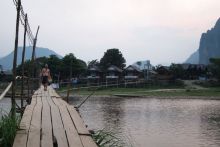The best word to describe Laos is laid-back to the point of being half-assed. It seems nobody ever makes any effort at anything. Vendors act like they could care less about selling their products. You hear touts shouting words “pancakes” or “massage” on the street, but with no enthusiasm whatsoever, as if they do not care about making money. Waiters idle in the restaurants not paying any attention to what is going around and the best way to make an order or pay the bill is to take an initiative yourself. Contrast it with Pai in Thailand, an extremely laid-back place, where restaurants are closed for an afternoon/day/two/week, if the owner feels like it. But if the restaurant is open, the service is top-notch. In Laos restaurants stick to their schedule, but they act like they do not do any business. No music, no lights in the evening time and no other signs of activity. It is non-stop siesta time. Why work, when you can spend all your day lying in a hammock. The national pastimes are napping, celebrating and chilling out. All these activities are fueled by food, Beerlao, weed and opium. Granted this mentality might have something to do with the dry season and the fact that there is not much farm work to do during this time. Compare it with the winter time in the pre-industrial Europe, where summers were filled with hard labour and winters were about pretty much passing time away by sleeping. It would be interesting to see if things are any different in Laos in the wet season.
On the other hand, it is not like Laotians are not interested in making money. They are, they are just not sure how. There is a bar/restaurant on the sunset side of Don Det called Happy Bar. The place is always packed, which goes in contrast with deserted restaurants on the same side of the island (it is the season ending). The secret of their success is the guy Manny from England, who seemed to be the only one who did any work there. Taking orders, delivering orders, being responsible for the music (Bob Marley and minimal techno instead of Lao pop), entertaining clientele and occasionally preparing food. The rest of Lao stuff just chilled around. It was entertaining to see how Manny taught the place owner such business tricks as making a list of people and taking a deposit for a BBQ boat trip in order to estimate how much food to prepare. The owner seemed to be genuinely surprised that such a thing was possible. On one of those trips the locals in the passing by boat appeared as if they were taking notes on how to make money off foreigners with nothing else than a couple of boats and a portable ice box full of Beerlao. Truly fascinating. I did not feel like spending any money in Laos, because frankly there was nothing to buy. Food is rather bland, local delicacies are almost nonexistent and the selection on local shops and markets is rather strange. Once we made it to a Lao New Year celebration with a fair in the rural Laos. The fair featured such exciting items as light bulbs, batteries, car parts and packaged processed food. Most convenience stores seemed to feature similar assortment. Business is definitely not one of the strongest points of Lao people, but maybe it is better this way.
At times it seemed like Laotians are not capable of thinking logically. As if they have not yet developed the ability of rational thinking. A couple of examples are in order. There were two slow boats from Huay Xai to Luang Prabang almost packed to the full capacity. On the next day after a night at Pak Beng, the second boat magically disappeared and boat operators tried to convince everyone that that there would not be a second boat. And what is more fascinating they actually tried to accommodate everyone on the single boat. Only after they realized that it was impossible to fit two fully packed boats into one boat (what a surprise!), a second boat appeared. Another example took place in Vang Vieng. There is a narrow wooden bridge wide enough to for two people to pass each other. Locals and some brave tourists are courageous enough to drive motorbikes on that bridge (the main motivation is to save 10000 kips to cross the river on a proper bridge 100m away). What is more surprising that sometimes locals attempt to ride motorbikes to opposite directions at the same time. It goes something like this: both motorcyclists start crossing the bridge perfectly seeing that there is another bike coming from the opposite direction, meet each other in the middle, realize that the bridge is just not wide enough for two motorbikes, retreat and start the whole operation from scratch. Lao Lao, indeed. This all reminded me of a point made by Ken Wilber in “A Brief History of Everything”, where he argued that the ability to think rationally became a baseline in Western countries only at some point of history (so called Age Of Reason). Prior to that most people were, well, not very rational. It seems that the rational baseline is yet to be reached in the rural Laos.

